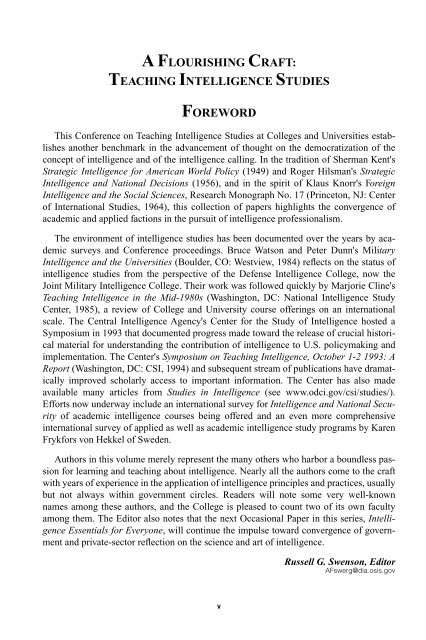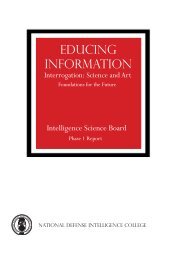A FLOURISHING CRAFT - Higgins Counterterrorism Research Center
A FLOURISHING CRAFT - Higgins Counterterrorism Research Center
A FLOURISHING CRAFT - Higgins Counterterrorism Research Center
- No tags were found...
Create successful ePaper yourself
Turn your PDF publications into a flip-book with our unique Google optimized e-Paper software.
A <strong>FLOURISHING</strong> <strong>CRAFT</strong>:TEACHING INTELLIGENCE STUDIESFOREWORDThis Conference on Teaching Intelligence Studies at Colleges and Universities establishesanother benchmark in the advancement of thought on the democratization of theconcept of intelligence and of the intelligence calling. In the tradition of Sherman Kent'sStrategic Intelligence for American World Policy (1949) and Roger Hilsman's StrategicIntelligence and National Decisions (1956), and in the spirit of Klaus Knorr's ForeignIntelligence and the Social Sciences, <strong>Research</strong> Monograph No. 17 (Princeton, NJ: <strong>Center</strong>of International Studies, 1964), this collection of papers highlights the convergence ofacademic and applied factions in the pursuit of intelligence professionalism.The environment of intelligence studies has been documented over the years by academicsurveys and Conference proceedings. Bruce Watson and Peter Dunn's MilitaryIntelligence and the Universities (Boulder, CO: Westview, 1984) reflects on the status ofintelligence studies from the perspective of the Defense Intelligence College, now theJoint Military Intelligence College. Their work was followed quickly by Marjorie Cline'sTeaching Intelligence in the Mid-1980s (Washington, DC: National Intelligence Study<strong>Center</strong>, 1985), a review of College and University course offerings on an internationalscale. The Central Intelligence Agency's <strong>Center</strong> for the Study of Intelligence hosted aSymposium in 1993 that documented progress made toward the release of crucial historicalmaterial for understanding the contribution of intelligence to U.S. policymaking andimplementation. The <strong>Center</strong>'s Symposium on Teaching Intelligence, October 1-2 1993: AReport (Washington, DC: CSI, 1994) and subsequent stream of publications have dramaticallyimproved scholarly access to important information. The <strong>Center</strong> has also madeavailable many articles from Studies in Intelligence (see www.odci.gov/csi/studies/).Efforts now underway include an international survey for Intelligence and National Securityof academic intelligence courses being offered and an even more comprehensiveinternational survey of applied as well as academic intelligence study programs by KarenFrykfors von Hekkel of Sweden.Authors in this volume merely represent the many others who harbor a boundless passionfor learning and teaching about intelligence. Nearly all the authors come to the craftwith years of experience in the application of intelligence principles and practices, usuallybut not always within government circles. Readers will note some very well-knownnames among these authors, and the College is pleased to count two of its own facultyamong them. The Editor also notes that the next Occasional Paper in this series, IntelligenceEssentials for Everyone, will continue the impulse toward convergence of governmentand private-sector reflection on the science and art of intelligence.Russell G. Swenson, EditorAFswerg@dia.osis.govv
















